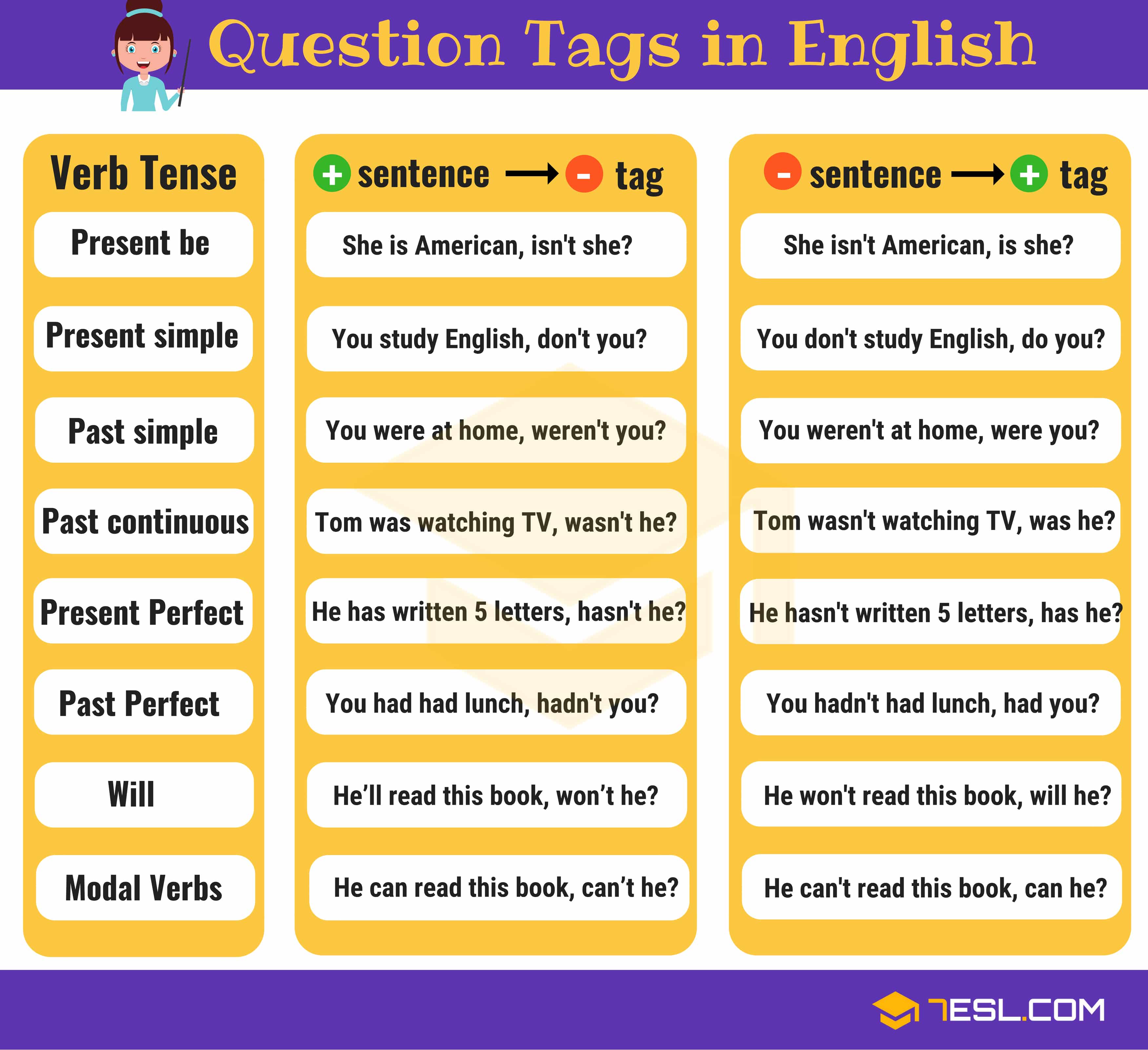Question Tags! A question tag is something which can turn a statement into a question. Sounds pretty simple, right? That’s because it is. An example of this would be the statement ‘you don’t eat meat.’ By adding a question tag, you turn it into a question ‘you don’t eat meat, do you?’
In this section, we are going to be taking a closer look at what question tags are and how they can be used, allowing you to be more confident in using them yourself.
What are Question Tags?
Learn how to form tag questions in English with useful grammar rules, video, example sentences and ESL printable worksheets.
We use question tags at the end of statements to ask for confirmation. They mean something like: “Are you okay?” or “Do you think so?” They are very common in English.
Tag question definition & examples

Rules for Forming Tag Questions
How to Form Question Tags in English?
To form the two-word tag questions, you must follow the rules below:
- The subject in the statement matches the subject in the tag.
- The auxiliary verb or verb to be in the statement matches the verb used in the tag.
- If the statement is positive, the tag is usually negative and vice versa.
Examples:
- He’s read this book, hasn’t he?
- He read this book, didn’t he?
- He’s reading this book, isn’t he?
- He reads a lot of books, doesn’t he?
- He’ll read this book, won’t he?
- He should read this book, shouldn’t he?
- He can read this book, can’t he?
- He’d read this book, wouldn’t he?
Tag questions in English
Exceptions in Forming Question Tags
Statements with Negative Adverbs
The adverbs never, seldom, hardly, rarely, … have a negative sense. We treat statements with these words like negative statements, so the question tag is normally positive.
Example:
- We have never seen that, have we?
Statements begin with I’m
We use the verb form are/aren’t I when the subject is the first person singular.
Example:
- I’m intelligent, aren’t I?
Statements begin with Let’s
We use shall we after sentences with Let’s.
Example:
- Let’s take the next bus, shall we?
- Let’s go home, shall we?
With Imperatives
Sometimes question tags are used with imperatives (invitations, orders), but the sentence remains an imperative and does not require a direct answer. We use won’t you for invitations, and can you/can’t you/will you/would you for orders.
Example:
- Open the window, will you? (order – less polite)
- Take a seat, won’t you? (invitation – polite)
With There… structure
When we use the there… structure, there is reflected in the tag.
Example:
- There‘s nothing wrong, is there?
- There weren’t any problems when you talked to Jack, were there?
Statements with Nobody/No one, Somebody/Someone, Everybody/Everyone as the subject
We use the pronoun they in question tags after statements with nobody/no one, somebody/someone, everybody/everyone as the subject.
Example:
- Somebody wanted to borrow Jack’s bike, didn’t they?
Statements with Nothing/Something/Everything as the subject
When the subject is nothing/something, we use it in the tag question.
Example:
- Something happened at Jack’s house, didn’t it?
Statements with This
When the subject is this, we use it in the tag question.
Example:
- This will work, won’t it?
Note:
We can use affirmative tag questions after affirmative sentences to express a reaction such as surprise or interest.
Example:
- You’re moving to London, are you?
Question Tag Intonation
We use falling intonation on question tags when we are checking information and we expect the listener to agree.
Example:
- It’s a lovely day, isn’t it?
We use rising intonation to ask a real question, when we are unsure whether the statement is true or not, or when asking for information and making requests.
Example:
- You couldn’t do me a favor, could you?













0 Comments